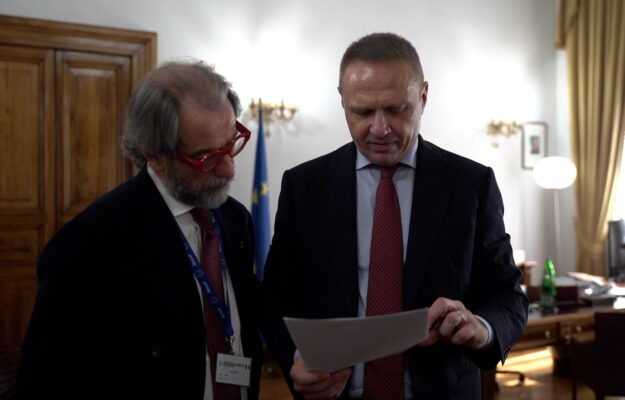What would Italy be like without wine? WineNews asked the Minister of Agriculture and Food Sovereignty, Francesco Lollobrigida this question as well as addressing many other topics, in the "one-on-one" interview recently at the Ministry located in Via XX Settembre (video of the full interview here). His answer was very clear, “Without wine Italy would be a poorer Nation, from all points of view. Economically, because it is a strategic asset in our economy, and there would be more unemployment, because thousands and thousands of jobs are linked to wine and related industries. There would be more environmental problems all over our Nation” continues Lollobrigida continued, “because just looking around when you cross the Chianti hills, the lands of Prosecco, Amarone and wherever there are vineyards, you will see nature protected, and well maintained. Our Nation would lose a piece of its culture, for instance in art, because wine has always been a primary subject for many painters, poets, artists, and so on. And, it would be a poorer Country from the point of view of food well-being, because we would be losing a precious element. We must work to protect it and to improve it, even though Riccardo Cotarella (president of the Italian and World Oenologists, ed.) says that wine today is a product of exceptional quality compared to the products in the past, and this guarantees more safety”.
This was one of the many topics, as mentioned, addressed during the interview. The backdrop was the first “Wine Ministerial Meeting”, organized together with OIV - International Organization of Vine and Wine, led by Luigi Moio, which is celebrating 100 years in 2024. On April 12th, the political and wine worlds will meet in Franciacorta, and the Ministry will also be participating at Vinitaly, in a space that is double the size compared to previous years. The history of wine will be narrated as well as innovation, including works from the Torgiano Wine Museum, the Borghese Gallery, the Archaeological Museum of Naples, Cinecittà and multimedia spaces created especially for the event.
Of course, the main focus will be on the hottest topics, which some people identify with winds of “neo-prohibitionism” in Europe and around the world. For instance, the health warning labels on all alcoholic beverages that Ireland introduced a few months ago, or the highly restrictive proposal on communication and advertising Belgium launched, and the recent revision of guidelines on consumption of alcoholic beverages in countries such as Canada (and other countries ready to follow in their footsteps, ed.), suggesting just two glasses a week.
“Certain things should be left to science that offers many different evaluations on alcoholic beverages. That alcohol is not a positive element is actually an objective fact”, the Minister pointed out, “however, that alcohol-based drinks are harmful is subjective within the scientific community. And, to a large extent, it attributes a positive value to consuming wine, sparingly, as Socrates famously said, who spoke of well-being, and conviviality is also an important element. We must distinguish when speaking about wine, spirits, and other alcoholic-based products, keeping them separate, because they are different. There are Countries where alcoholism has a devastating impact, but where wine is not consumed or has never taken root, and Ireland is one of these Countries. And, instead, where wine could be an antidote to consuming low quality spirits. I don't want to give “health advice”, the Minister emphasized, “but these considerations are often based on empirical data. If wine has always been an element in the Italian diet, and we are one of the longest-lived Nations on the planet, perhaps wine is not as devastating as some people want to portray it, considering that those who do not consume wine do not have a better quality of life than ours. It is not an objective fact, obviously, but the doubt must be raised when a specific element of a complex diet is affected, in this case wine, and where the scientific community does not have a single voice on this topic”. In any case, linked to the issue of greater attention to health, there is the boom of alcohol-free wines, which the European Union has regulated, but Italy has not yet done so. And, though many producers have been asking for a law that allows them to produce it in Italy, no law is yet forthcoming. “There is a European framework that allows production of alcohol-free drinks, which, however, I struggle to call wine. The market definitely exists”, Minister Lollobrigida explained, “but I myself do not think it is reasonable to call wine something that is not. Instead, wine has its own specificities, such as alcohol, which is formed naturally in the production process, as Professor Luigi Moio has said. There are many drinks, today, that don’t necessarily have to be called wine. We will obviously comply with regulations, trying to avoid, however, excessive sophistication of the production procedures that distance these products from our quality. I would like this to be very clear, since I have also said it to those producers who say there is a slice of the market that is opening up, and it must be protected. It is not a given that when one market opens another one closes, in terms of value. If wine becomes something different from what Italy invests in with excellent results, are we sure that Italy will still be the Country of excellent quality? It is an impelling subject that does not offer certainties, but which must be taken into account”.
Copyright © 2000/2026
Contatti: info@winenews.it
Seguici anche su Twitter: @WineNewsIt
Seguici anche su Facebook: @winenewsit
Questo articolo è tratto dall'archivio di WineNews - Tutti i diritti riservati - Copyright © 2000/2026







































































































































































































